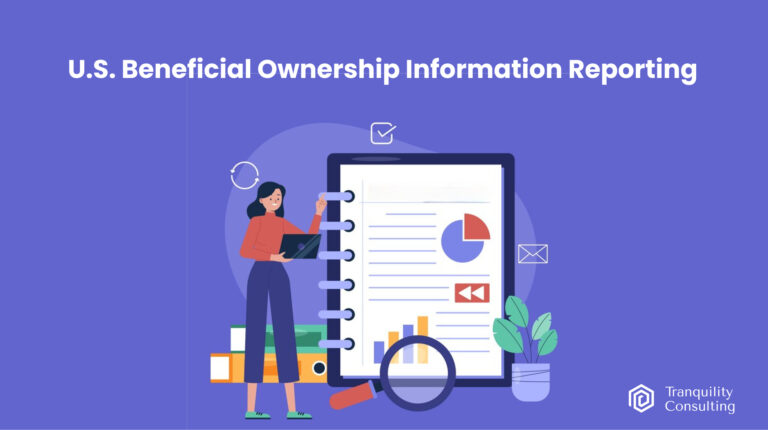Beneficial ownership information reporting (BOIR) is important to corporate transparency. As the business world becomes more interconnected, understanding the implications of BOIR is essential for both companies and regulators. The following article dives into the key aspects of beneficial ownership information reporting, exploring what it is, why it matters, and what businesses need to know to comply with regulations.
What is Beneficial Ownership Information Reporting (BOIR)?
Beneficial Ownership Information Reporting (BOIR) refers to the process by which companies must disclose the individuals who ultimately own or control them. This includes identifying the “beneficial owners” who hold significant control over the company, even if they are not listed as directors or executives. BOIR aims to enhance transparency in the financial and corporate sectors.
Beneficial Owners
A beneficial owner directly or indirectly owns or controls a company. These individuals usually benefit from the company’s profits or decisions, even if they don’t appear in the official ownership records. In many cases, beneficial owners hold a certain percentage of shares or voting rights in a company, which gives them considerable influence over its operations.
The BOI Report
The BOI report is the document companies must submit detailing the information of their beneficial owners. This report includes personal information such as names, addresses, nationality, and the extent of ownership or control. For most businesses, completing this report is a mandatory compliance step, particularly under regulatory frameworks designed to prevent money laundering and other illicit activities.
Why is Beneficial Ownership Information Reporting Important?
One key purpose of BOIR is to prevent financial crimes like money laundering and terrorism financing. By identifying the actual owners of companies, authorities can more easily track illicit transactions or individuals attempting to hide their wealth behind shell companies. BOIR fosters corporate transparency by ensuring that those who control a company’s decisions are known to regulators, investors, and the public. This transparency helps build trust in the financial system and promotes accountability in corporate governance.
Fulfilling BOIR requirements ensures compliance with national and international laws for businesses operating in regulated industries. Countries with strict regulations, such as the U.S., the EU, and the UK, often require businesses to file beneficial ownership information reports with their respective authorities.
The Key Elements of a BOI Report
1. Company Information
The BOI report must provide essential details about the company, such as its name, registration number, and legal structure. This information helps authorities link the beneficial ownership data with the correct company.
2. Information on Beneficial Owners
The primary focus of the report is on the beneficial owners themselves. Companies need to disclose information such as:
- Full name
- Nationality
- Date of birth
- Residential address
- Nature and extent of ownership or control
3. The Ownership Structure
A detailed breakdown of how ownership is structured within the company must be provided to complete the report. This includes identifying individuals who hold a significant amount of shares or voting rights.
4. Control and Influence
In addition to ownership details, companies must disclose how each beneficial owner exercises control or influence over the company, including decision-making and financial matters.
Beneficial Ownership Information Reporting Requirements
Global Variations in Reporting Standards
While BOIR requirements are similar across many countries, specific regulations vary based on jurisdiction. For example, in the U.S., beneficial ownership information reporting is required under the Corporate Transparency Act (CTA), which mandates that certain types of businesses, such as LLCs and corporations, report their beneficial owners to the Financial Crimes Enforcement Network (FinCEN).
Key Reporting Requirements by Country
- United States: The CTA requires all companies registered in the U.S. to submit a beneficial ownership information report to FinCEN. This includes any entity created or registered to do business in the U.S.
Penalties for Non-Compliance
Failing to submit a boi report can lead to severe penalties. In many countries, penalties range from hefty fines to potential criminal charges, depending on the severity of the non-compliance. Ensuring that the information is accurate and submitted on time is crucial for avoiding such repercussions.
Who Must File a BOI Report?
- Corporations, LLCs, and Other Legal Entities: Most legal entities, such as corporations, limited liability companies (LLCs), and partnerships, must file beneficial ownership information reports. This includes private and public entities, though public companies may already have certain disclosure requirements overlapping with BOIR.
- Exemptions and Exceptions: Some jurisdictions provide exemptions for certain types of companies. For example, publicly listed companies or large companies with a significant international presence may be exempt from filing boi reports under certain conditions. Businesses need to check whether they fall under any exemption categories.
How to Ensure Compliance with BOI Reporting
- Consulting Legal Experts: Businesses should consult with legal and compliance experts to navigate the complexities of BOI reporting requirements. These professionals can help collect and submit all necessary information correctly.
- Regular Audits: Regular audits of ownership structures and control mechanisms can help businesses meet their BOI reporting obligations. Audits also ensure that the information provided to authorities remains accurate over time.
- Using Technology for Compliance: Various tools and software solutions help businesses manage their BOI reporting and compliance efforts. These tools streamline data collection, reporting, and monitoring, reducing the risk of human error.
Conclusion
Beneficial ownership information reporting is becoming increasingly important for corporate transparency and the fight against financial crime. Understanding boi reporting requirements and ensuring compliance with beneficial ownership information reporting rules is essential for any business. Companies that accurately identify and disclose beneficial owners contribute to a safer and more transparent financial ecosystem.
FAQs
1. What is the deadline for submitting a BOI report?
- The deadline for submitting a boi report varies by country and jurisdiction. In the U.S., the Corporate Transparency Act mandates that companies submit their reports within a year of formation or by the due date of the next annual filing.
2. Can beneficial ownership information be kept private?
- Beneficial ownership information is publicly accessible in some countries, while in others, it is only available to regulators or law enforcement. It depends on local laws.
3. Are all companies required to file a BOI report?
- Some exemptions apply, particularly for publicly traded companies and large multinational corporations. Check your local regulations to determine if your business is required to file.
4. What penalties exist for failing to submit a BOI report?
- Penalties for non-compliance with beneficial ownership information reporting can include fines and, in severe cases, criminal charges.
5. How is Tranquility Consulting helping businesses with compliance in BOI reporting?
- Tranquility Consulting helps businesses comply with BOI reporting by providing expert guidance on identifying and disclosing beneficial owners. We ensure accurate and timely submissions, reducing compliance risks and enhancing transparency.
If you have any questions or need business-related tax consulting advice, please contact us at: [email protected]





